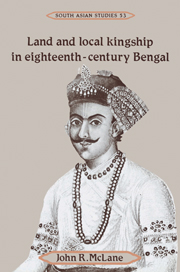Book contents
- Frontmatter
- Contents
- List of tables
- Preface and acknowledgments
- List of abbreviations
- Select glossary
- Map of southwest Bengal
- Part I Bengal
- 1 Introduction
- 2 Nazims of Bengal and the large zamindars
- 3 Collecting rents and revenues
- 4 Coercion
- 5 Political gifts and patronage
- Part II Burdwan
- Bibliography
- Index
- Cambridge South Asian Studies
4 - Coercion
from Part I - Bengal
Published online by Cambridge University Press: 13 October 2009
- Frontmatter
- Contents
- List of tables
- Preface and acknowledgments
- List of abbreviations
- Select glossary
- Map of southwest Bengal
- Part I Bengal
- 1 Introduction
- 2 Nazims of Bengal and the large zamindars
- 3 Collecting rents and revenues
- 4 Coercion
- 5 Political gifts and patronage
- Part II Burdwan
- Bibliography
- Index
- Cambridge South Asian Studies
Summary
Physical coercion of delinquent rent and revenue payers was a routine feature of Mughal Bengali life. Bengali political practice treated the administering of corporal punishment according to dharmic rules as a necessary ingredient of localized authority and as a ritual of power. Authority to punish wrong-doing and compel the payment of revenue was delegated so that any person assigned to gather revenue enjoyed a de facto power to punish and coerce, usually without more than nominal supervision by state employees. Detentions, mild beatings, and the use of peons or foot soldiers to force people to pay their revenue were general phenomena in the early decades of Company rule and, almost as certainly, in the pre-Company period as well.
By the time the British began to rule Bengal, British attitudes towards non-familial chastisement were evolving towards a view that the individual should be a special object of protection by society's rules, by formal law. Eighteenth-century liberalism increasingly regarded physical coercion as the proper monopoly of the state and viewed private or non-state detentions, beatings, and torture as illegitimate, as a violation of the rights of individuals. Implicitly, some employees of the East India Company began to question an element of Bengali social organization that accepted the prerogative of leaders of innumerable small, local hierarchies to assume and imitate the functions of the raja in disciplining their subjects.
When Company servants objected to zamindari coercion of their tenants, they initially faulted the private agency of corporate punishment rather than the punishment itself.
- Type
- Chapter
- Information
- Land and Local Kingship in Eighteenth-Century Bengal , pp. 69 - 95Publisher: Cambridge University PressPrint publication year: 1993



